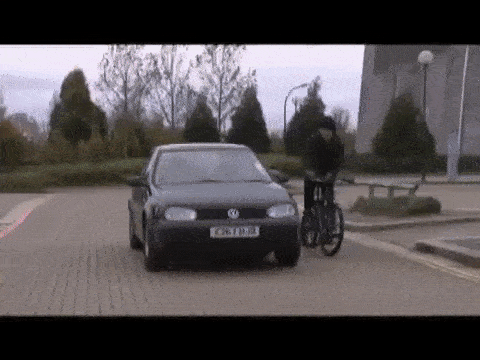
When a south american bus company wanted to drum home to its trainee drivers the importance of giving cyclists a wide berth, their solution was simple; they sat them on exercise bikes at the side of the road while they overtook them at a distance closer than the recommended 1.5 metres.
Close passes by motorists are as much a part of cycling on British roads as potholes, but there can be only two possible explanations for why a motorist overtakes dangerously close to a cyclist – incompetence or malice.
In the absence of widespread and good quality infrastructure to protect cyclists from motorised traffic, The Safer Roads Partnership and operational policing teams from both Warwickshire Police and West Mercia Police have pioneered Operation Close Pass – a scheme to reduce the number of cyclists killed or injured on their region’s roads. Close passes are intimidating and nationally account for around a third of all threatening incidents between drivers and cyclists.
The initiative, which is now being adopted by other forces, uses plain clothes officers on bikes equipped with front and rear facing cameras. Any driver seen passing closer than the recommended distance (1.5 metres) is pulled over.
The results are encouraging with the number of cyclists killed or seriously hurt on the region’s roads reduced by 20 per cent since West Midlands Police launched the operation. Props used by the police include giant floor mats to illustrate the correct passing distance and these are now to be complemented by a film by Cycling UK that police will show to drivers at the roadside via a VR headset. These initiatives are to be applauded, but no amount of current technology can replicate the visceral experience of having one’s life threatened by a close pass.
When we asked 800 cyclists reveal their least favourite aspect of life on two wheels, the vast majority named the close pass. In response we built a handlebar-mounted flame thrower – a design that’s neither practicable for everyday use nor legal for use on British roads, but does at least highlight to drivers that overtaking a cyclist too close is a life-threatening behaviour.

The solution to the close pass lies not in giant floor mats, undercover police officers on bicycles, VR films – and certainly not in flamethrowers. They say that in order to empathise, one should walk a mile somebody else’s shoes. In the case of motorists, this doesn’t mean imagining the world outside the metal box, it means occasionally leaving the car at home and cycling instead. In fact, there’s a strong argument that the first few driving lessons should be aboard a bicycle. Last summer, a peer-reviewed study for the journal Accident Analysis and Prevention found that cyclists had faster reaction times behind the wheel compared to non cyclists.
Ethical cycle insurance
Check your small print for so-called ‘new-for-old’ replacement – many insurers use the term, but if your bicycle is more than a few years old, they devalue it severely. This means you are left out of pocket when you come to replace it.
With ETA cycle insurance, however old the bike, if it’s stolen you get enough to buy a new model. Furthermore, every cycle insurance policy you buy from us helps support the work of the ETA Trust, our charity campaigning for a cleaner, safer transport future. No wonder The Good Shopping Guide judges us to be ethical in Britain.

John Hepworth
There are cycle lanes painted on some roads, where the lane is so narrow that a vehicle 1m from the painted line, would still be less than 1.5m from a bike. Surely there should a standard that outlaws such potentially dangerous lanes.
It is less clear what canbe done about drivers who appear to believe that a cyclist has zero width and can therefore always be overtraken.
robert p Griffiths-garrod
“incompetence or malice” or just plain couldn’t give a monkeys for anyone else’s safety.
Vincent
The Police in Keighley wouldn’t take any action against a motorist who hit me with his wing mirror because he was out of area. I wondered if I’d been killed or injured if the same would have applied. Make no mistake cyclist’s are no better than vermin and are legitimate road kill. It’s no good having a 1.5m safe pass law if it’s not enforced. A law that’s not enforced; well is it even a law?
David
I have always thought there should be a progression / regression system where one (except for medical reasons) can’t pass a driving test without first passing a cycling proficiency test. A road user acquiring over a set number of penalty points would be required to retake their cycling proficiency test prior to being allowed to resume driving. Repeat offenders perhaps should be required to also retake their driving test.
Such an arrangement would hopefully result in a better understanding of all other road users’ needs and responsibilities, and much less tribal attitudes between the different types of road users. It might even leed to fewer adults cycling on narrow pavements / pedestrians stepping out in front of cyclists.
Matt Hodges
Great clip. Can you send this to all bus companies.